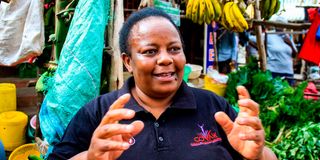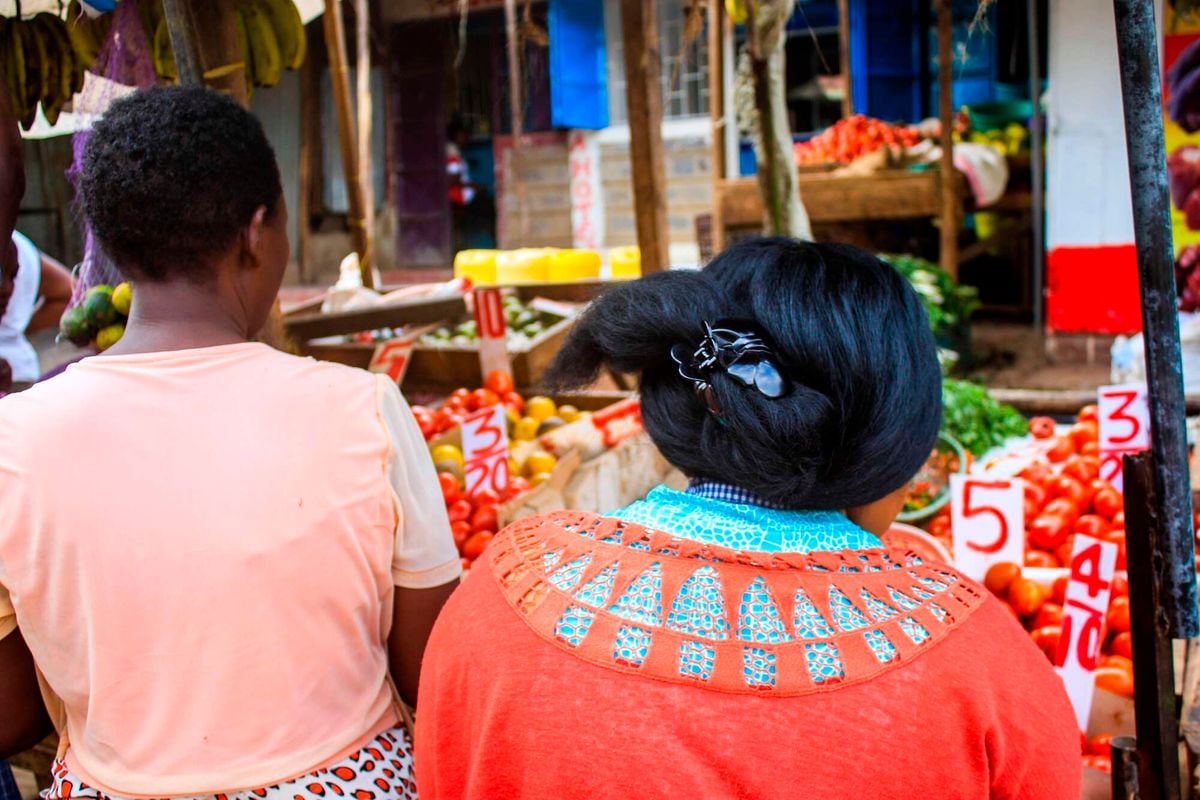[ad_1]
We’re seated in a stall belonging to Doreen Wanja*, a girl in her 50s who has been a greengrocer for many years.
She operates in one of many public markets in Nairobi. It’s minutes previous noon, so she has a couple of clients to take care of.
“I awakened at 4.30am immediately as a result of the truck bringing my merchandise from West Pokot arrived in Nairobi sooner than I anticipated.
“Relying on what is obtainable, I often supply lemons, pumpkins, avocados and mangoes and resell,” she says.
As she rearranges her mangoes, we’re joined by one in every of her associates, Josephine Atieno*, who can also be a greengrocer. She can also be in her 50s and has been in the identical marketplace for the previous twenty years.
Atieno tells Nation.Africa that in dry seasons, provides cut back they usually need to supply fruit and veggies from so far as Uganda.
Wanja says, “The vehicles arrive in Nairobi at totally different instances. It could possibly be as early as 6am or as late as 1am. We often need to pay county taxes for every truck that enters the market.
“The officers are at all times on the gate. We additionally pay the market officers Sh100 and a few native younger males Sh100 for ‘safety.’”
Though the 2 acknowledge the significance of paying taxes, they can’t perceive why they need to pay safety charges. This has been the supply of their predicament: sexual violence.
They are saying victims select to not communicate up for worry of reprisal.
“When you don’t have cash, the lads (market officers and a few native males) will demand to have intercourse with you to waive the cost.
“Typically they are going to block the trail in order that the truck can not get into the market.
“Final yr, I didn’t find the money for to pay for a few vehicles that had introduced my items to the market; they tried to rape me,” Wanja reveals.
Wanja recounts the occasions of that day when she had tried hiding from the lads. Nonetheless, at round 9pm, one of many market officers cornered her into one of many stalls.
“Wewe Wanja leo utanifanyia hivyo (You’ll have intercourse with me immediately, Wanja),” she quotes one of many males as having advised her.
“He was about to flip me over when a lorry drove into the market and shone its headlights on us. He had been uncovered and shortly ran away.”
Wanja provides that at instances, the officers threaten them with crude weapons akin to knives.
“I do know the younger man very effectively. I even know his spouse and household, however I can not report him as a result of they are going to goal and destroy my enterprise. That is my solely livelihood.
“If I had been to report him, I must go away this market,” Wanja says.
Middlemen
Even when sourcing items at numerous farms throughout the nation, the ladies say they nonetheless get sexually assaulted.
Atieno, who often will get her fruits from Machakos County, tells Nation.Africa that the middlemen typically ask for intercourse to introduce them to farmers who wish to promote their produce.
“Even when you have got paid them for his or her providers, which is often Sh2,000, they might refuse to load the sacks of produce onto your truck until you have got intercourse with them.
“When you reject their calls for, you’ll keep together with your baggage on the farm for therefore many hours earlier than getting assist to load the produce,” she reveals.
Joyce Mwangangi, a paralegal working with girls merchants, confirms that Nairobi market officers are infamous perpetrators of violence.
“As a result of the merchants need to pay a day by day rental price of Sh100 for his or her stalls and a price for each truck that brings of their produce, the lads have a variety of energy over them,” Ms Mwangangi says.
“The officers are very highly effective and have the power to even negotiate with middlemen who convey produce to the market.
“At instances the ladies merchants are requested to have intercourse with them in order that their money owed with the middlemen may be waived.”

Joyce Mwangangi, a paralegal, throughout an interview at a Nairobi market on January 10, 2024.
Picture credit score: Billy Ogada I Nation Media Group
Consequently, the ladies have nobody to show to for assist. They’re cornered at a number of factors of harassment all through their enterprise.
Ms Mwangangi collects details about harassment and stories to cops.
“I additionally encourage them to make use of toll-free numbers ran by organisations such because the Coalition on Violence In opposition to Girls (Covaw) once they expertise harassment,” she says.
Nonetheless, Khadija Tsuma, a police officer on the Kariobangi North Gender Desk, says that though they obtain complaints from paralegals akin to Ms Mwangangi, they can’t begin investigating instances with out a formal grievance from the sufferer.
“They (victims) needs to be brave and decide to report the perpetrator and be keen to undergo the courtroom means of prosecuting the matter. With out their complaints, the case in opposition to such perpetrators is weak.
“Despite the fact that this will threaten their livelihood, it’s the solely strategy to entry justice,” Ms Tsuma tells Nation.Africa.
Dr Anne Gachiri, a gender professional, classifies the abuse as financial gender-based violence.
“Abuse in opposition to girls merchants has been sanitised. In truth, some merchants would even advise the ladies to provide in to the calls for in order that they will function their companies peacefully.
“This emboldens the perpetrators to maintain harassing such girls,” Dr Gachiri explains.
She provides that the ladies merchants are extra weak than most different working girls as a result of they’re low-income earners.
As such, society doesn’t see them as victims as a result of they’re anticipated to yield to such calls for.
Research findings
Her assertions are corroborated by a 2020 paper printed by UN Girls on “Harassment within the Casual Economic system: Farm employees and Home Staff”.
It established that the informality of any commerce presents challenges akin to reliance on verbal and precarious settlement, unsafe working environments and excessively lengthy hours.
Thus girls, who make up the biggest portion of employees within the casual financial system, expertise discrimination exhibited in some ways akin to harassment.
Nation.Africa spoke with Roselyn Mukabana, county anti-GBV marketing campaign coordinator, on the matter.
She mentioned town has a gender working group that features enterprise leaders, however her workplace has not acquired any stories of harassment.
When requested the place the affected girls would search recourse as most of them are too intimidated to report the perpetrators for worry of retaliation, Ms Mukabana responded that they need to attain out to her.
Meantime, her workplace has launched investigations.
On Monday, she mentioned she was ready for the end result of the investigations to assist them take motion and maintain the culprits to account.
A current research performed by Covaw on financial exclusion of ladies concerned casual enterprise in Nairobi discovered that one of many main challenges confronted by girls in casual companies is harassment.
The violence is additional exacerbated by lack of electrical energy as 80 per cent of casual companies can not entry it.
“Whereas financial independence doesn’t protect girls from violence, entry to financial sources can improve girls’s capability to make significant selections.
“The violence girls face retains them poor partially as a result of their poverty inhibits their skill to search out options,” the report stories.
Additional, a 2020 research, “Exploring Prevalence of Harassment inside the Casual Sector in Kenya” printed by Hivos East Africa, discovered that the common prevalence of harassment was 47 per cen.
The vast majority of victims are girls at 58 per cent, whereas the lads had a decrease prevalence of 35 per cent.
The research additionally discovered that 68 per cent of individuals reported incidence of harassment of their working space.
Typically, this harassment would happen exterior the working areas, which was not inside the authority of the enterprise house owners or couldn’t be witnessed by colleagues.
In the meantime, for Wanja and Atieno, their agony is worsening with each passing day.
They now need Nairobi County, via its Commerce Division, to have unbiased gender desks inside the market the place such instances may be addressed with out survivors having the worry of being stigmatised.
Hurdles on the highway to justice
Whereas formal workplaces get pleasure from structured methods and establishments that tackle sexual harassment, lawyer Riziki Emukule explains that the casual financial system doesn’t get pleasure from the identical privileges.
“The Employment Act, 2007, strictly mandates organisations to formulate and implement a sexual harassment coverage and a strategic plan to stop such misconduct of their workplaces.
“All staff are additionally required to be told of the coverage and sensitised to what the doc entails,’” she says.
In such locations, victims and survivors of sexual harassment can use inside mechanisms akin to reporting to their disciplinary boards and even transfer to courtroom in the event that they’re nonetheless not glad.
Nonetheless, within the casual financial system, that’s not doable.
Ms Emukule notes that though such girls might organise themselves in self-help teams or be working with community-based organisations, there may be nonetheless little room for accountability.
She says the ladies are an amorphous group that’s not beneath any establishment.

Lawyer Riziki Emukule. She says girls working within the casual sector have little treatment within the present authorized framework and have sexual violence survivors to file a category motion swimsuit.
Picture credit score: Picture | Pool
“The mechanisms for redress for such girls are additionally not watertight. There isn’t any employer to carry to account as a result of they’re self-employed.
“Though girls are protected beneath numerous provisions of the Structure, you’ll solely discover that solely extremely publicised or ugly instances will probably be reported. Most instances will slip via the cracks.”
She goes on to clarify that litigation may be fairly prolonged and costly. The survivor will probably be required to attend courtroom appearances on the drawback of her work, which she makes use of to earn day by day wages.
Additional, the method can also be evidence-based and it’s tough to assemble proof from casual work areas.
“Who will arise as your witness? Do fellow merchants even have time to attend courtroom? There may be additionally an inherent worry and distrust of the regulation as a result of the perpetrators are in positions of energy in such markets.”
Despite the fact that she lauds specialised sexual and gender-based violence courts, she nonetheless notes that there are solely three such courts in Kenya and they aren’t accessible to many ladies working in casual sectors.
Sufferer safety
The Sufferer Safety Act seeks to guard victims of any offence and gives cures.
“Ideally, the provisions of the Sufferer Safety Act, 2014, ought to help such girls to have entry to secure homes and supply psychosocial help. Nonetheless, such establishments lack the capability to cater to all arising instances.”
Subsequently, in case survivors of sexual harassment within the casual sectors wish to pursue authorized redress, Ms Emukule advises them to current a joint grievance as a category motion.
She emphasises that “there may be energy in numbers.”
*Names of the victims have been modified to guard their identities.
[ad_2]




